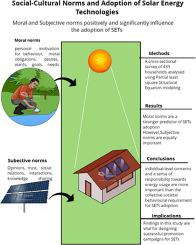Examining social-cultural norms affecting the adoption of solar energy technologies at the household level
引用次数: 0
Abstract
The relevance of social culture in determining energy consumption behaviour is repeatedly highlighted, yet it is still unclear how social-cultural factors affect the uptake of solar energy technologies- SETs. The study highlights social-cultural norms as one of the aspects rarely considered for solar energy adoption and utilises the Energy Cultures Framework to examine the influence of such norms on the acceptance and usage of solar energy technologies SETs at the household level. The study comprised a cross-sectional survey of households from three urban districts in central Uganda (n = 439), and data was analysed using partial least squares structural equation modelling method. The results showed that moral and subjective norms positively and significantly influence the adoption of SETs. However, the influence of moral norms on adoption is relatively stronger than that of subjective norms on adoption. These findings imply that individual-level concerns and a sense of responsibility towards energy usage are more important than the collective societal behavioural requirement for SETs adoption. This study distinctively highlights the relevance of the different types of norms and offers valuable insights into households’ energy usage behaviour, which is essential for designing successful promotion campaigns for SETs and increasing the adoption and usage of more sustainable energy alternatives. Increased adoption of SETs is an important part in the development, implementation, and achievement of energy policy goals.

审查影响在家庭一级采用太阳能技术的社会文化规范
社会文化在决定能源消费行为方面的相关性被反复强调,然而社会文化因素如何影响太阳能技术的吸收仍然不清楚。该研究强调社会文化规范是很少考虑太阳能采用的一个方面,并利用能源文化框架来检查这些规范对家庭接受和使用太阳能技术集的影响。该研究包括对乌干达中部三个城区的家庭进行横断面调查(n = 439),并使用偏最小二乘结构方程建模方法对数据进行分析。研究结果表明,道德规范和主观规范对社会行为准则的采用有显著的正向影响。然而,道德规范对收养的影响相对强于主观规范对收养的影响。这些发现表明,个人层面的关注和对能源使用的责任感比采用set的集体社会行为要求更重要。这项研究特别强调了不同类型规范的相关性,并为家庭能源使用行为提供了有价值的见解,这对于设计成功的set推广活动以及增加更可持续的能源替代品的采用和使用至关重要。在制定、实施和实现能源政策目标的过程中,碳排放交易系统的采用是一个重要组成部分。
本文章由计算机程序翻译,如有差异,请以英文原文为准。
求助全文
约1分钟内获得全文
求助全文

 求助内容:
求助内容: 应助结果提醒方式:
应助结果提醒方式:


